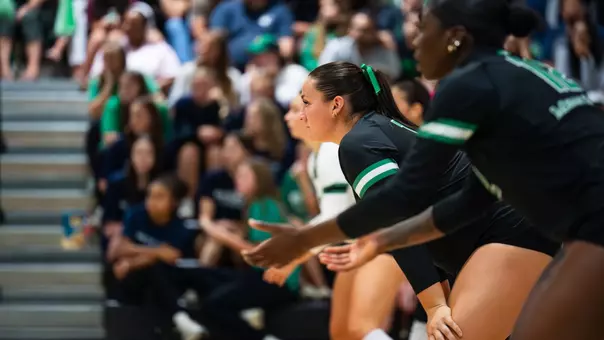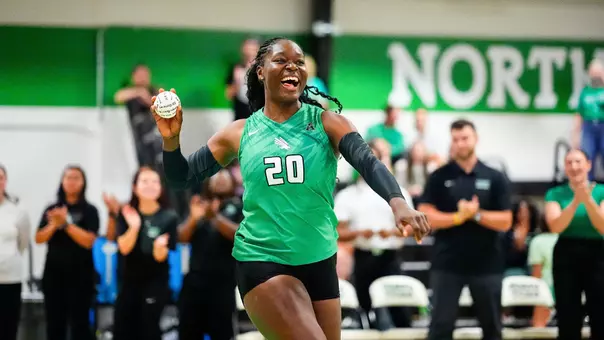
Photo by: Manny Flores
Digging into MGVB's unique Hawaiian culture
8/18/2020 1:00:00 PM | Women's Volleyball
It's a cool 74 degrees as the sun sets and the Pacific Ocean waves crash against the shore near Waimanalo Beach. The clear, blue water and golden sand that border the beautiful island of Oahu make for astonishing views.
At the same time, just off the coast, a young woman wearing a tan sundress is taking center-stage at a luau. The young woman – current Mean Green volleyball player Aleeyah Galdeira – is moving her body to the slow, relaxing sound of music. She's performing a traditional Hawaiian hula dance for her family and friends.
Hula is just one of the many traditions that Galdeira performs in an effort to express her Hawaiian culture, and she isn't shy about maintaining those Aloha practices when making the 3,700 mile trip to Denton, Texas, to play volleyball for the Mean Green.
"A lot of us hold a certain pride about being Hawaiian," Galdeira said. "Whenever we come to the mainland or go other places and people ask us where we're from, we're proud to say 'Hawaiian.'"
Galdeira isn't the only Hawaii-native on the roster. In fact, incoming freshman Pua Beazley and head coach Andrew Palileo are also from the Aloha State.
Beazley and Galdeira grew up less than 10 miles from one another and trained at the same volleyball club – Rainbows Volleyball Club. However, they never actually took the court together.
"We knew of each other, but we never talked or anything," Galdeira said. "It seems weird, considering we played at the same club and lived close by, but for some reason we were never able to play together until Pua came to UNT."
Although they barely knew of each other, Galdeira – who is entering her sophomore season – was excited to have a fellow Hawaiian join her on the team. Because the island is so small geographically, nearly everyone knows each other or is connected to one another in some way. Beazley described the atmosphere within the Hawaiian culture as "family-oriented."
"Everybody in Hawaii has this tight-knit bond that is indescribable," Beazley said. "There's no other culture like ours, and we're proud to show the world everything there is to know about Hawaiians. I just love where I grew up."

As most would expect, there are several – okay maybe more than several – differences between the Hawaiian and American culture.
In Hawaii, people call their elders and people of authority "auntie" and "uncle", even if they're not actually an aunt or uncle. For example, instead of "Mr. Palileo", Hawaiians would say "uncle Palileo." Another sign of respect is taking shoes off before entering the house.
"One of the challenges of coming to Texas was not knowing what to call our elders or how to show that we respect people," Beazley said. "It has taken some getting used to because our cultures are just so different. We've actually taught some of our teammates a little bit about Hawaiian culture so they can understand where we come from."
The close-knit bond between Hawaiians is also a large part of why Galdeira and Beazley committed to Palileo and North Texas coming out of high school.
"Having Pali as the coach definitely had its part in me deciding to come to North Texas," Beazley said. "When you're on the islands, you can be sheltered from the outside world because we're not even close to the mainland. Just knowing that we have someone who has experienced what we went through at this age was huge in my recruiting process.
Beazley also said that when she saw Galdeira had been a part of the team for a season, she felt a level of comfort that she couldn't find when looking at other universities. With Galdeira at North Texas, the Mean Green were essentially a lock.
When Galderia learned that Beazley would be joining the team, she could hardly contain her excitement.
"When she came up here, it was an automatic feeling of 'I'm going to look out for Pua,' Galdeira said. "We, as Hawaiians, are extremely supportive of each other and have each other's backs. I am just so glad she's here in Texas with me. It has definitely made the adjustment easier and more enjoyable."
Palileo has now recruited three players from his home state in his seven years at North Texas. He helped Galdeira to an outstanding freshman season in 2019 with 332 digs, which was ninth in all of Conference USA. Although they are all connected , Galdeira and Beazley are no pushovers on the court. Beazley is one of the more talented setters that Palileo has recruited and will compete for playing time in 2020.
While Palileo will enjoy watching his team compete during the upcoming season, it's more about creating lasting relationships and caring for one another, especially in a time where our world has been impacted by the global COVID-19 pandemic.
"Families and parents want to know if you're going to take care of their children," Palileo said. "Once they know you'll care for them, they're extremely loyal. That was the key in recruiting all of our players, not just the local Hawaiian kids. Now that we have them here, I think our families know that their children are in great hands."
Galdeira and Beazley also shared the importance of preserving the Hawaiian culture. Neither Beazley, Galdeira nor their parents know how to speak Hawaiian. That's because during the last 100 years – after Hawaii was annexed by the United States – many schools began to only teach English.
However, schools have recently began to reinstall the Hawaiian culture and language into everyday life.
"Our Hawaiian culture is disappearing daily, but luckily this generation in schools now are attempting to perpetuate the Hawaiian culture and language," Beazley said. "People don't understand where we're coming from. I want to preserve the culture I love and represent."
Love. Respect. Persevere. It's what the Hawaiian culture is all about.
At the same time, just off the coast, a young woman wearing a tan sundress is taking center-stage at a luau. The young woman – current Mean Green volleyball player Aleeyah Galdeira – is moving her body to the slow, relaxing sound of music. She's performing a traditional Hawaiian hula dance for her family and friends.
Hula is just one of the many traditions that Galdeira performs in an effort to express her Hawaiian culture, and she isn't shy about maintaining those Aloha practices when making the 3,700 mile trip to Denton, Texas, to play volleyball for the Mean Green.
"A lot of us hold a certain pride about being Hawaiian," Galdeira said. "Whenever we come to the mainland or go other places and people ask us where we're from, we're proud to say 'Hawaiian.'"
Galdeira isn't the only Hawaii-native on the roster. In fact, incoming freshman Pua Beazley and head coach Andrew Palileo are also from the Aloha State.
Beazley and Galdeira grew up less than 10 miles from one another and trained at the same volleyball club – Rainbows Volleyball Club. However, they never actually took the court together.
"We knew of each other, but we never talked or anything," Galdeira said. "It seems weird, considering we played at the same club and lived close by, but for some reason we were never able to play together until Pua came to UNT."
Although they barely knew of each other, Galdeira – who is entering her sophomore season – was excited to have a fellow Hawaiian join her on the team. Because the island is so small geographically, nearly everyone knows each other or is connected to one another in some way. Beazley described the atmosphere within the Hawaiian culture as "family-oriented."
"Everybody in Hawaii has this tight-knit bond that is indescribable," Beazley said. "There's no other culture like ours, and we're proud to show the world everything there is to know about Hawaiians. I just love where I grew up."

As most would expect, there are several – okay maybe more than several – differences between the Hawaiian and American culture.
In Hawaii, people call their elders and people of authority "auntie" and "uncle", even if they're not actually an aunt or uncle. For example, instead of "Mr. Palileo", Hawaiians would say "uncle Palileo." Another sign of respect is taking shoes off before entering the house.
"One of the challenges of coming to Texas was not knowing what to call our elders or how to show that we respect people," Beazley said. "It has taken some getting used to because our cultures are just so different. We've actually taught some of our teammates a little bit about Hawaiian culture so they can understand where we come from."
The close-knit bond between Hawaiians is also a large part of why Galdeira and Beazley committed to Palileo and North Texas coming out of high school.
"Having Pali as the coach definitely had its part in me deciding to come to North Texas," Beazley said. "When you're on the islands, you can be sheltered from the outside world because we're not even close to the mainland. Just knowing that we have someone who has experienced what we went through at this age was huge in my recruiting process.
Beazley also said that when she saw Galdeira had been a part of the team for a season, she felt a level of comfort that she couldn't find when looking at other universities. With Galdeira at North Texas, the Mean Green were essentially a lock.
When Galderia learned that Beazley would be joining the team, she could hardly contain her excitement.
"When she came up here, it was an automatic feeling of 'I'm going to look out for Pua,' Galdeira said. "We, as Hawaiians, are extremely supportive of each other and have each other's backs. I am just so glad she's here in Texas with me. It has definitely made the adjustment easier and more enjoyable."
Palileo has now recruited three players from his home state in his seven years at North Texas. He helped Galdeira to an outstanding freshman season in 2019 with 332 digs, which was ninth in all of Conference USA. Although they are all connected , Galdeira and Beazley are no pushovers on the court. Beazley is one of the more talented setters that Palileo has recruited and will compete for playing time in 2020.
While Palileo will enjoy watching his team compete during the upcoming season, it's more about creating lasting relationships and caring for one another, especially in a time where our world has been impacted by the global COVID-19 pandemic.
"Families and parents want to know if you're going to take care of their children," Palileo said. "Once they know you'll care for them, they're extremely loyal. That was the key in recruiting all of our players, not just the local Hawaiian kids. Now that we have them here, I think our families know that their children are in great hands."
Galdeira and Beazley also shared the importance of preserving the Hawaiian culture. Neither Beazley, Galdeira nor their parents know how to speak Hawaiian. That's because during the last 100 years – after Hawaii was annexed by the United States – many schools began to only teach English.
However, schools have recently began to reinstall the Hawaiian culture and language into everyday life.
"Our Hawaiian culture is disappearing daily, but luckily this generation in schools now are attempting to perpetuate the Hawaiian culture and language," Beazley said. "People don't understand where we're coming from. I want to preserve the culture I love and represent."
Love. Respect. Persevere. It's what the Hawaiian culture is all about.
Players Mentioned
Olympic Village Facility Reveal | Mean Green VB + S&D
Tuesday, May 06
Broadcast Highlights vs Rice | Mean Green Volleyball
Monday, November 18
Broadcast Highlights vs Tulsa | Mean Green Volleyball
Saturday, October 19
Broadcast Highlights vs UTSA | Mean Green Volleyball
Sunday, October 13










